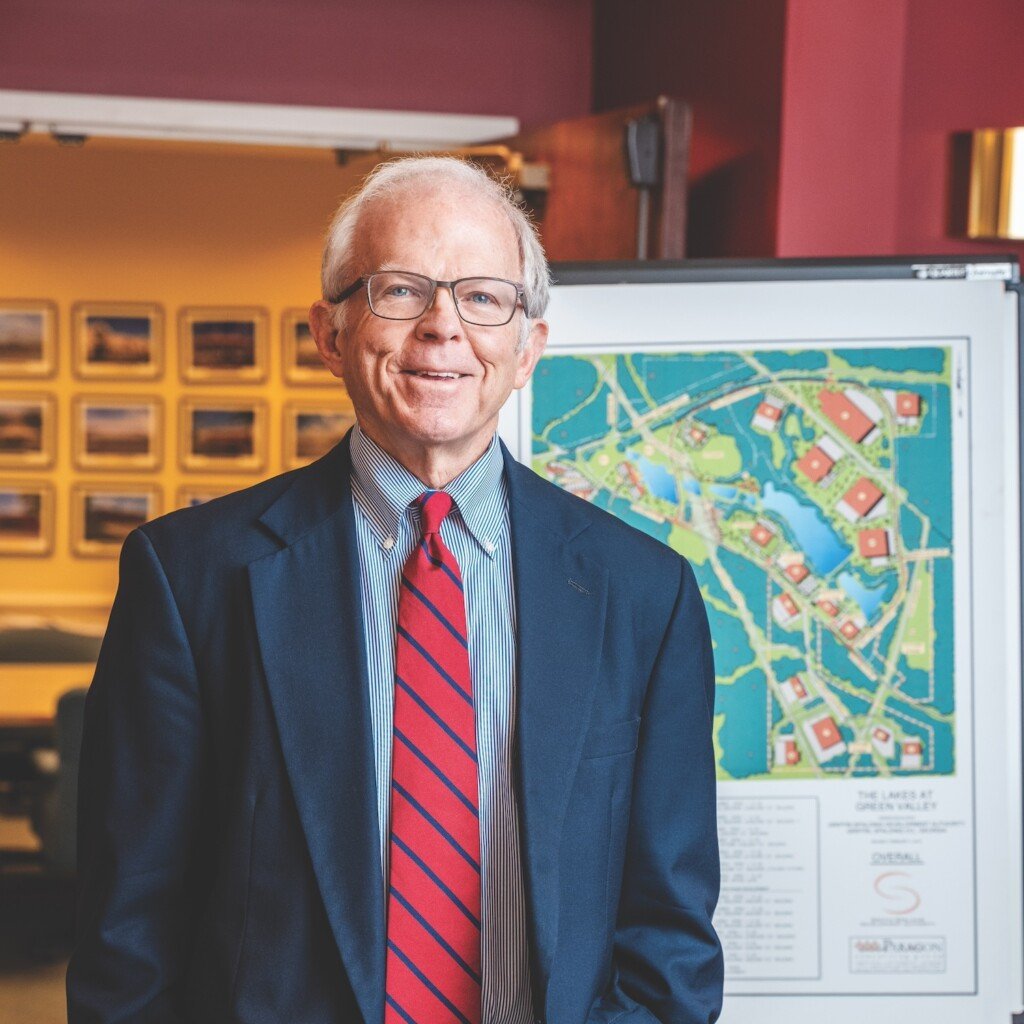North Fulton County: Embracing Technology
Innovations, preservation and history.
 North Fulton County is home to some of Georgia’s youngest cities, but business roots run deep there. The Greater North Fulton Chamber of Commerce marked its golden anniversary in 2023, celebrating its 50th year with a gala and a series of special events. And the North Fulton Community Improvement District (NFCID), which includes properties in Alpharetta, Milton and Roswell along Georgia 400, turns 20 this year. In addition to its history as a well-heeled suburb, North Fulton has a thoroughly invested business community.
North Fulton County is home to some of Georgia’s youngest cities, but business roots run deep there. The Greater North Fulton Chamber of Commerce marked its golden anniversary in 2023, celebrating its 50th year with a gala and a series of special events. And the North Fulton Community Improvement District (NFCID), which includes properties in Alpharetta, Milton and Roswell along Georgia 400, turns 20 this year. In addition to its history as a well-heeled suburb, North Fulton has a thoroughly invested business community.
Its municipalities run the gamut from historic, long-established Roswell and Alpharetta (and tiny Mountain Park) to newer Milton and Johns Creek, born in a wave of Fulton County incorporations 17 years ago.

Business and Pleasure: Steve Stroud, executive director of Roswell Inc., in downtown Roswell: photo Eric Sun.
Each member of this cluster has its own unique identity, but their municipal priorities tend to be in sync: carefully planned development or, more often, redevelopment with a definite skew toward technology and healthcare. In Alpharetta, for example, AT&T is working with the CID on some improvements to its campus as it woos workers back to the office, while international financial services firm Morgan Stanley is expanding its campus when many corporate office footprints are shrinking.
“One of the unique things North Fulton has going for it is that a lot of North Fulton is a bedroom community. There are some great businesses here, but it is a great place to live,” says Steve Stroud, executive director of Roswell Inc., that city’s economic and business development organization.
Shared Resources
While each city has its own economic development efforts, they also have some shared resources.
The Greater North Fulton Chamber of Commerce moved in 2022 to 8,000 square feet of new quarters in Avalon, the mixed-use development in Alpharetta that personifies the “live-work-play” vibe of North Fulton.
“This is our 50th anniversary year, and we are celebrating all of the success we have had over these 50 years,” says Kali Boatright, president and CEO of the chamber.
The NFCID is planning to rebrand itself True North 400 this fall. North Fulton is one of the older CIDs in the state, says Kristin Winzeler, deputy executive director for the organization.

Celebrating Success: Kali Boatright, president and CEO of the Greater North Fulton Chamber of Commerce, at the chamber’s new office in Alpharetta: photo Eric Sun.
Winzeler notes that the CID is tackling one of the area’s big issues: traffic. When Georgia 400 was extended inside the Perimeter 30 years ago, its north-south ribbon of connectivity set off a business and residential boom in North Fulton that continues to this day – one reason Boatright calls the route “Technology Corridor.” But, Winzeler says, it’s a different story going east to west.
“One of the things the CID has done really well is we are building out a grid that helps with east-west connectivity,” Winzeler says. “North Fulton [has] limited east-west connectivity.”
Current projects include working with the city of Alpharetta to repair a culvert and roadway at the AT&T office in Alpharetta, among others. The partial list of projects in which the CID has or has had a role include Encore Parkway, Northwinds Parkway and Westside Parkway, as well as ongoing work with interchange landscaping and maintenance and a bus shelter program. These are all part of a larger program of work that the NFCID says involved investments over its history of $28 million to leverage $170 million in projects.

Managing Projects: Kristin Winzeler, deputy executive director for the North Fulton Community Improvement District: photo contributed.
For North Fulton to maintain its appeal as a thriving residential community and a hub for high-end jobs, it has yet another partner – the Fulton County Schools. One of the newest high schools in the area is FCS Innovation Academy, a STEM magnet school. Here you’ll find academic rigor (77.4% of the student body participates in Advanced Placement courses) and a high-tech career focus on healthcare, engineering and IT, which matches the businesses North Fulton has and seeks to recruit or expand.
The school, purpose-built for its specialized role and looking more like a college campus or corporate offices, has a student body of 1,500 with a waiting list the week before school opened of about 80 students for its entering freshman class, according to Principal Scott Kent.
“One of the big things that is important to talk about is the engagement we have had with our business partners,” he says, “and that really is by design.”
The relationship Kent describes goes beyond most school-business partnerships. “Our students dive deep into authentic experiences – they don’t just experience these pathways in their silos,” he says.
FCS Innovation Academy has more than 30 business partners, among them LexisNexis, Lockheed Martin, Microsoft and Wellstar.
Alpharetta: Tech Transformation
“Alpharetta has a tremendous amount of momentum – I think of this as Alpharetta’s second renaissance,” says Alpharetta Mayor Jim Gilvin. “Beginning in the 1980s, we grew to a major technology center in a quiet, safe community near Atlanta and with excellent schools. Over the last 10 years, people decided we were ready to be more than that. … We’re trying to transform Alpharetta into what appeals not just to major tech companies but also to the employees that work there.”
That approach is now focusing on redeveloping outdated office parks and select retail into mixed-use projects, Gilvin says. Modern office space needs to be amenity- rich, with shopping, dining, residential and entertainment within walking distance, he adds. Alpharetta already has some of those projects completed, others in the works and still others on the drawing board.
Consider Continuum, a mixed-use project at the former Hewlett-Packard corporate campus at Windward and Westside parkways. When finished, Continuum will include 1.3 million square feet of office space, another 73,800 square feet of retail and something like 400 residential units.
Alpharetta’s workforce is a selling point that attracts these mixed-use development and redevelopment projects, the mayor says.
“What we are finding is that a lot of investors are attracted to Alpharetta because of our great workforce. We have one of the most diverse workforces in the nation, and it is a strength,” Gilvin says. “So many people are invested in trying to have a diverse workforce.” He points out that around a quarter of the city’s population was born outside the U.S., noting his own immediate neighbors include people from South Africa, Norway and Scotland.
Federal figures back up those diversity claims, not just for Alpharetta but for other North Fulton cities. While all are majority-white, they include significant percentages of Asian, Black and Hispanic residents. In Alpharetta, 58.2% of the population is white, 22.2% is Asian, 12.1% Black and 7.6% Hispanic, per the latest U.S. Census.
Johns Creek: Medley Momentum
“Johns Creek was formed out of thin air, so we don’t have a natural town center, a crossroads, anything like that,” Mayor John Bradberry says. But that’s about to change, and in keeping with North Fulton’s current approach, a mixed-use development and public-private partnership are involved.
“In Johns Creek, what we say is there is no ‘there’ there. Medley will be the ‘there,’” says developer Mark Toro of the complex Toro Development will break ground on this fall, with an anticipated opening date of October 2025.
Toro is the man behind the highly successful Avalon in Alpharetta, and Medley bears a strong resemblance to the earlier project. The future complex will cover 200,000 square feet of retail, restaurant and entertainment space, 110,000 square feet of office space and almost 900 townhomes and apartments.
“[Avalon and Medley] are similar in style and impact. However, Medley is roughly less than one-third of the retail space, 20% of the office space and 40% of the residential. We’ve got more feet on the street from onsite residents and less commercial impact,” Toro says. The approximately 150 planned townhomes are being developed by Empire and will run between $800,000 and $1 million, he says, while rates on the upcoming 750 luxury apartment units have not been set yet.
Toro Development announced the first set of tenants this spring and a second set was to be rolled out in late September. Among the first set are Little Rey, by Atlanta restaurateur Ford Fry; CRÚ Food & Wine Bar; and Fadó Irish Pub.
In all, Medley accounts for about 42 acres of a 192-acre district in Johns Creek that has its city hall more or less in the middle. The plans include outdoor event space. Meanwhile, nearby Boston Scientific, a biomedical and biotechnology engineering firm, is taking a portion of what was once the State Farm location for a manufacturing site and R&D center.
Cauley Creek Park doubled the city’s park space when the 203-acre complex of sports courts and fields, a walking track, and a pedestrian bridge across the Chattahoochee River opened in late July. Bradberry says the city is looking for a private partner to turn some old buildings on the site into an event space.

Mixed-Use Development: Rendering of Continuum, which will include office, retail and residential space when completed: photo Southwest Value Partners.
Milton: Passion for Parks
“Our No. 1 goal in Milton is trying to keep our rural heritage,” says Mayor Peyton Jamison. One thing that helps keep development under control is the high cost of property. “There’s still land but it’s very expensive,” he says. Milton shares its neighbors’ passion for parks and continues to build out a network of trails with a goal of linking the city’s parks with its downtown.

Gathering Place: Rendering of Medley, a live/work/play development expected to open in Johns Creek in 2025: photo contributed.
Milton – population just under 42,000 – is not only committed to more green space but also to retaining its existing tree coverage. The city has a city arborist, a tree canopy preservation ordinance and requires homeowners to apply for a permit if they want to remove a tree.
When you take off your walking shoes and get in your car in Milton, you won’t go far without running into a roundabout. “We do not have a stoplight in the entire city, well, except there is one in Crabapple and one on Highway 9,” Jamison says.
Milton’s Deerfield area (located in the city’s southeast corner) is the most heavily commercialized part of the city, Jamison says.
And when it comes to city assets, in August Milton opened its first new fire station, located on Thompson Road where it razed a former Fulton County facility to make way for new construction.
Roswell: Big Projects
Roswell Mayor Kurt Wilson likes to talk public safety.
“Roswell is the largest city in the U.S. without a full-time fire department, so we’ve created a five-year plan,” Wilson says, adding the city will phase in the cost over five years until it achieves its goal.
Wilson also points to recent developments in the Roswell Police Department, which he says currently has zero vacancies. He attributes that status to a 20% pay increase recently approved for law enforcement officers.
Roswell’s citizenry has signed on with improved public safety, voting last November for $52 million in bond funding for new police and fire headquarters and fire stations. That ballot presented voters with an à la cart menu of options, from which voters approved all three measures, including $107.6 million for additional parks, recreation facilities, bike/pedestrian trails and sidewalks and $20 million for a parking garage in the historic Roswell downtown.
And this past summer, the city unveiled a transportation project long in the making – it was funded by a Transportation Special Purpose Local Option Sales Tax (TSPLOST) approved in 2016. The Oxbo Road Realignment not only straightened out a dangerous road – it once saw some 26 crashes a year – but also converted the road to a two-way street, extended Elm Street and added traffic calming features, new brick sidewalks and crosswalks and ADA-compliant ramps.
Such improvements are why Roswell was recently named one of the best places to live in the country by Livability, which annually ranks the top 100 best places to live based on aspects like amenities, transportation, education and more. It was one of only two cities in all of Georgia to make this list this year.
The other one to make the cut? Johns Creek. It just goes to show people are taking notice of all that North Fulton has offer.
Local Flavor
Horse and Wine Country

Family Business: Farm Director Juliette Johnson and her mother, Painted Horse Winery Founder Pam Borgel, at the vineyard and stable: photo Eric Sun.
Urban hustle and bustle has overtaken large parts of North Fulton County, but residents of Milton are hanging on to as much rural flavor as they can – and at the Painted Horse Winery, that flavor is one of about 24 or 25 different varieties of wine produced right in Milton.
Along with the equestrian operation known as Pamelot Farms, it’s the only farm winery in Fulton County, and together, the two operations make about as good an example of agritourism as you could find.
“It did not start as a business – but it turned into one quickly. The original thought was to bring in other children for my daughter to interact with as they rode horses,” says Pam Borgel, founder and owner of both the horse farm and the winery.
That was back in the mid-’90s, and today that daughter, Juliette Johnson, runs the animal side of the combined operation while her mom concentrates on the vineyard and winery. Johnson teaches beginning riders and also boards horses. The children’s birthday parties the mother/daughter team host feature other farm residents, including a cow, donkey and chickens.
Late this summer, Painted Horse saw its first real harvest of grapes as the vines Borgel planted a few years back matured. For five years the winery has used grapes imported from the West Coast and created about 20,000 bottles last year. Even with the maturing of the winery’s own vines, Borgel says, the operation will continue to import grapes, given the limited varieties that grow well here. But Painted Horse’s product still counts as a Georgia wine, since the identification travels with the winery, not the grapes.
The winery opens to the public on weekends, when guests can take part in any of a number of special events – sunset trail rides, barrel tastings, birthday parties, even an annual grape stomping. “We literally put the grapes in half-barrels, and you get to go stomp them,” Borgel says, recalling the famous I Love Lucy sketch. But the winery doesn’t actually use the foot-stomped grapes in their wine, she adds.
Those wines include a variety of reds, whites, a rosé and blends – along with the hard-to-categorize Hot Stuff Jalapeño Wine that has two Pamelot-grown jalapeños per bottle. Borgel suggests pairing it with Bloody Mary mix.











